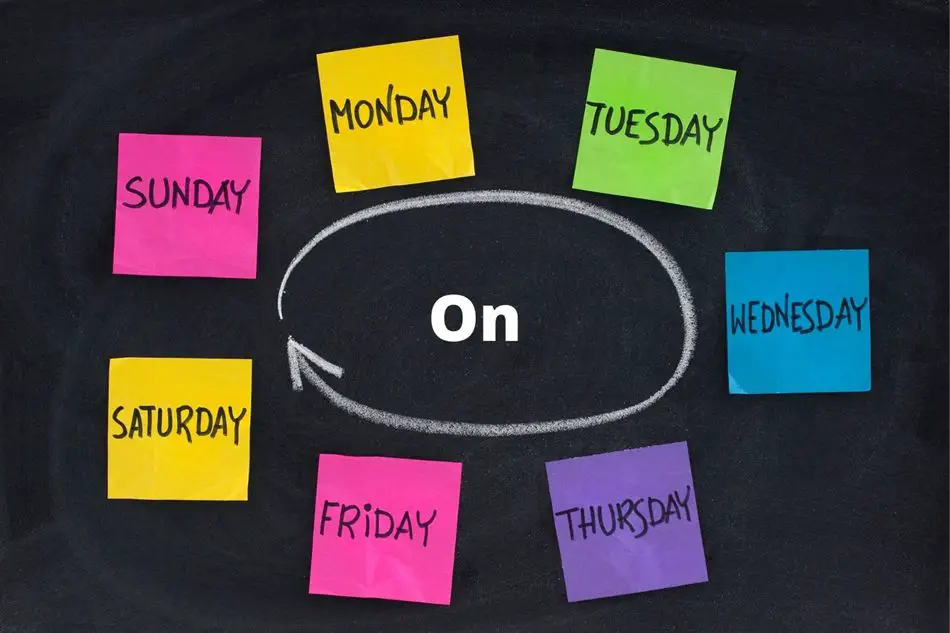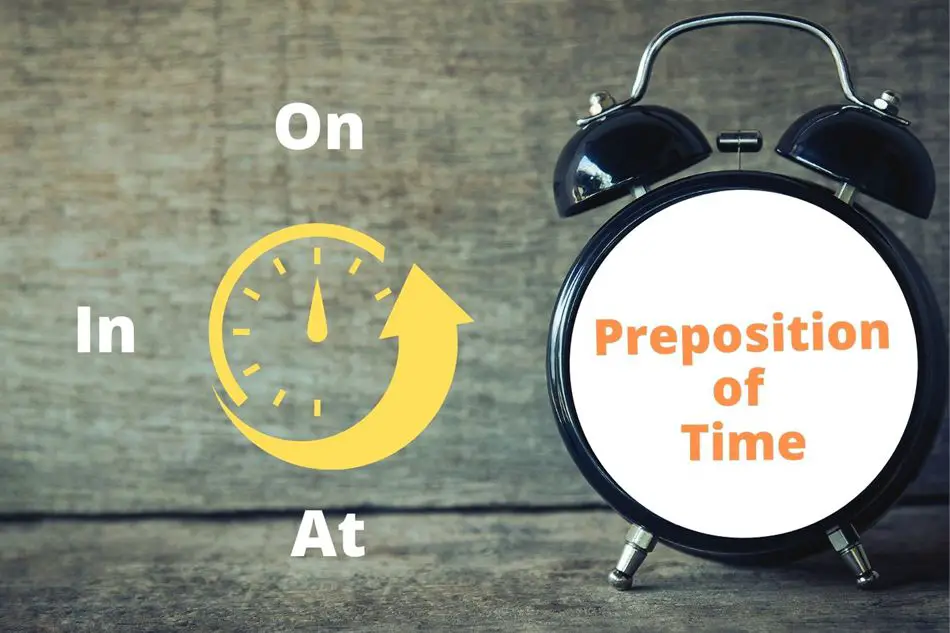A preposition is a function word that is placed before a noun or anything equivalent to a noun. Prepositions are used to create a connection between the noun and the other words of the sentence.
Example: My cousin will come on Monday.
In the above example, “On” is the preposition. The preposition is used to create a link between the noun “Monday” and the rest of the words. As “Monday” refers to a specific time, we call it a preposition of time.
“At,” “On,” and “In” are the three most common prepositions of time that we use before any noun in a sentence to create a time connection between the object (noun) and the rest of the other words in the sentence. A preposition of time helps us understand any specific year (In 2001), month (In July), date (On 26th June), day (On Sunday), time (6 o’clock), etc.
Try The Blue Book of Grammar and Punctuation: An Easy-to-Use Guide with Clear Rules, Real-World Examples, and Reproducible Quizzes (Amazon Link) to understand the major rules and subtle guidelines of English grammar and usage. This best-seller includes easy-to-understand rules, abundant examples, dozens of reproducible quizzes, and pre and post tests for middle and high schoolers, college students, ESL students, homeschoolers, and more.
| Use of “At” as a Preposition of Time | Use of “On” as a Preposition of Time | Use of “In” as a Preposition of Time |
| We usually use “At” for a specific time of day and any particular day, such as a holiday or festival. | We usually use “On” for all the seven days of the week and any specific date of a calendar. | We usually use “In” for any month, year and season. |
Though prepositions are one of the significant parts of speech that we use in most sentences, I find many of my students make mistakes in using prepositions. I have already mentioned the primary uses of prepositions of time in the above table.
However, there are some other uses too. In this post, I will share some essential rules and relevant examples for each rule that will surely help you learn prepositions of time: At, On, and In.
“At” Is Used for Clock Times
Example 1: Anne called me at 5 o’clock.
Example 2: They left at 3 PM.
“At” Is Used for Any Specific Time of the Day
Example 1: Ruana will meet us at lunchtime.
Example 2: He will text me at night.
| Note: Noon, lunchtime, dinnertime, bedtime, sunrise, sunset, night, etc., are the words that take “At” before them. Exception: The words “morning,” “afternoon,” and “evening” do not take “At” before them, though they refer to a specific time of a day. I will talk about them in the latter part of the post. |
“At” Is Used for Specific Points in Time

Example 1: Razib is busy at the moment.
Example 2: At present, he is working on our new website.
| Note: The moment, the end, the start, the same time, etc., are the phrases that take “At” before them. |
“At” Is Used for Holidays or Festivals
Example 1: They go for an outing at the weekends.
Example 2: We visit our relatives at Eid.
| Note: Some native speakers of English also prefer using “On” before holidays and festivals. I will talk about it in the next part of the post. |
“On” Is Used for Any Day of the Week

Example 1: Rishita will join on Monday.
Example 2: They arrived on Saturday.
| Note: We also use “On” before, “Thursday night,” “Saturday morning,” “Friday evening,” etc. |
“On” Is Used for Any Date of the Month
Example 1: Rabina will be there on 6 June.
Example 2: My father will visit my place on 16 December 2021.
“On” Is Used for Any Special Day
Example 1: We’ve decided to launch the new product on Victory Day.
Example 2: I will publish my next book on my birthday.
Example 3: My parents send me gifts on Christmas Day.
“In” Is Used for Any Month of the Year
Example 1: I was born in June.
Example 2: They will go to India in April.
“In” Is Used for Any Season
Example 1: I love to visit my grandparents’ place in winter.
Example 2: Different flowers bloom in spring.
“In” Is Used for Any Year
Example 1: My younger brother started learning guitar in 2019.
Example 2: Jhohan was born in 2000.
“In” Is Used For the Century
Example 1: Novel became a popular genre of literature in the 19th century.
Example 2: Many social media platforms have flourished in this century.
“In” Is Used for General Times of the Day

Example 1: My father loves to have a 30-minute walk in the morning.
Example 2: We play football in the afternoon.
Example 3: I come back home in the evening.
“In” Is Used for a Long/Extended Time
Example 1: He was more active in the past.
Example 2: I will never make this mistake in the future.
Example 3: We are living in an era of technology.
Example 4: T.S Eliot was a significant poet in the modern age.
No Preposition for Last, Next, This, Every, Today, Yesterday
Example 1: I went to Dhaka last month.
Example 2: Billie will apply for a new job next year.
Example 3: She called me this morning.
Example 4: My niece goes to school every day.
Example 5: We have a meeting today.
Example 6: He arrived yesterday.
In Conclusion
Prepositions of time and place are considered the two difficult areas that ESL learners struggle to master. Yet, I expect the above discussion on “At,” “On,” and “In” will help you to master the use of prepositions of time correctly.
I hope the discussion will help you to understand everything about the use of prepositions of time: at, on, and in.
Thanks for reading.
Happy learning!






1 thought on “Preposition of Time: At, On, and In”